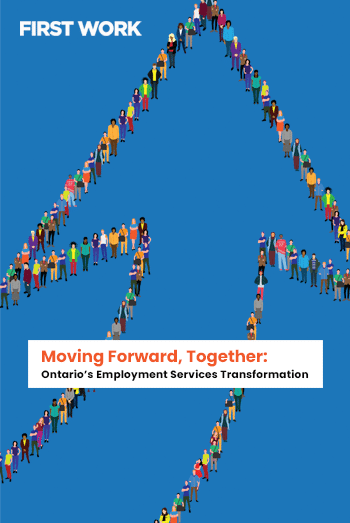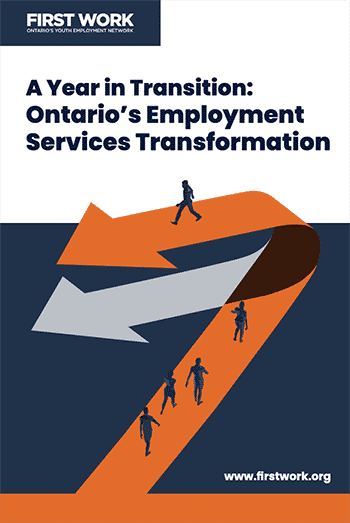The Weight of Paperwork: A time diary study on the impacts of the Employment Services Transformation in Ontario
25 July 2024 – As part of First Work’s ongoing research initiative monitoring the integrated employment services transformation in Ontario, between October and November 2023, we conducted a Time Diary study.
The purpose of this study was to gain a better understanding of how the job responsibilities of frontline staff of Employment Service Providers (ESPs) were impacted during the transformation process. It sheds light on the alignment between the theoretical vision of transformation with the real-world experiences of frontline staff, highlighting the practical implications of the new Integrated Employment Services model.
Based on findings from the Time Diary study, this brief sets out recommendations for the Government and Service System Managers (SSMs) to:
- Strengthen the employment services ecosystem through enhanced capacity building, funding and resourcing supports, policy adjustments, and organizational structures;
- Address the increased administrative load through establishing a multi-level government automated verification of employment attainment through notification of EI/CPP contributions to enable ESPs to continue to provide quality service for all Ontarians;
- Enhance focus on evaluating the quality of client services, rather than solely taking into account the quantitative outcomes targeted by the new model;
- Monitor closely the various challenges faced by actors operating within the new model, to address and strengthen the system’s ability to respond to emerging challenges at pace.
It is vital for the Ministry and SSMs to understand the various challenges and strengthen the system’s ability to respond to challenges at pace and through co-production with delivery organizations.
The Weight of Paperwork brief is part of a multi-year transformation monitoring framework by First Work. Data collected in the Time Diary study also informed the comprehensive report, Making it Work: Delivering the Transformation Promise in Ontario, released by First Work in July 2024.
Making it Work: Delivering the Transformation Promise in Ontario
11 July 2024 – First Work released a report independently monitoring the Integrated Employment Services (IES) rollout processes across Ontario.
The report explores how this transformation, implemented by the Ministry of Labour, Immigration, Training and Skills Development (MLITSD), is delivering on its promise to promote greater integration between Employment Ontario (EO) and Ontario Works (OW).
Grounded in insights from the frontline, this report highlights key successes and challenges faced by the employment services sector during the launch of the new model and introduction of new Service System Managers (SSMs). It finds that while the transformation is aiming to improve employment outcomes for recipients of Ontario Works (OW) and the Ontario Disability Support Program (ODSP) and to reduce service duplication across systems, several challenges remain, particularly when it comes to serving Ontarians with disability and those facing complex barriers to employment.
The report finds that while progress has been made to build a more efficient and outcome-focused system, significant operational and financial challenges remain in the implementation of the new model. It urges stronger collaboration and communication between the Ministry, SSMs and ESPs. Key recommendations include:
- Reassess the 20-hours of work per week program target for Ontarians furthest from employment.
- Reintroduce dedicated supports for young people.
- Specify the role of Service System Managers.
Moving Forward Together: Ontario's Employment Services Transformation
26 May 2023 - First Work releases its third report on Ontario's Employment Services Transformation (EST), offering on-the-ground insights and recommendations for enhancement to this systems-change.
Since 2019, Ontario has been undertaking a transformation to the employment supports offered through the Ministries of Labour, Immigration, Training and Skills Development (MLITSD), and Children, Community and Social Services (MCCSS).
Ontario’s EST is intended to better integrate the siloed-system of supports so that those facing barriers can successfully transition into meaningful employment by:
- Integrating all provincially distributed employment supports into one system overseen by MLITSD.
- Introducing revised service catchment areas and new oversight actor, Service System Managers (SSMs), in each catchment.
- Introducing performance-based funding to promote retention and accountability.
This report aims to:
- highlight the impacts and challenges of this new Integrated Employment Services (IES) model, and
- generate continued solution-focused discussion.
Ontario’s Employment Services Transformation
A Year in Transition: Ontario’s Employment Services Transformation
Ontario’s employment services transformation is 1 year underway and First Work has been monitoring the transition on-the-ground to deliver insights and recommendations for a better employment system for all.
First Work began monitoring the Ontario employment services transformation in late 2020, with the aim to capture and understand the successes and challenges faced by the prototype regions. Through ongoing research and open dialogue during this transformation, First Work has generated insights on the experiences of employment service providers (ESPs), service system managers (SSMs), and job seekers from a secondary research, ESP and SSM perspective
First Work has undertaken an extensive research process culminating in this report in absence of transparent monitoring, evaluation and communication from government. In fairness to the challenges that come with an undertaking of this magnitude, First Work prioritized balance in reporting, as reflected in the document.
“The complexity of this undertaking, the uniqueness of the local and regional landscapes, and the unexpected impacts of the pandemic on the planning and execution of this transformation cannot be underestimated.” – Akosua Alagaratnam
Through this report and beyond, First Work's network will continue to identify gaps and offer best practices in workforce development to support sustainable, quality outcomes for job seekers and businesses alike. First Work will continue to leverage our network to develop sector and region-specific partnerships with employers, while scaling approaches that respond to the needs and challenges of employers and workers across the province.
Early Insights Report
First Work has decided to release an Early Insights Report on the findings we have uncovered through this monitoring research endeavour. Click here or visit First Work’s member’s portal for the Early Insights Report, Ontario’s Employment Services Transformation: A Good Vision.




